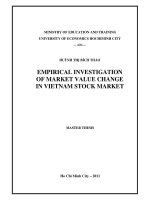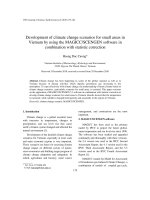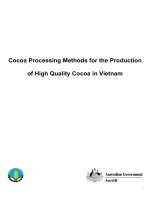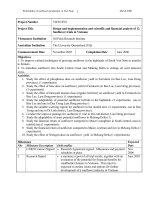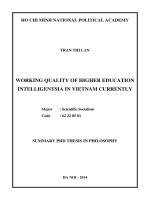RE-STRATIFICATION OF MALARIA ENDEMIC AREAS IN VIETNAM 2019
Bạn đang xem bản rút gọn của tài liệu. Xem và tải ngay bản đầy đủ của tài liệu tại đây (340.46 KB, 17 trang )
<span class="text_page_counter">Trang 1</span><div class="page_container" data-page="1">
<b>OF MALARIA AND PARASITIC DISEASE CONTROL </b>
<small>- Prof. Dr. NGUYEN THANH LONG - Prof. Dr. LE BACH QUANG </small>
<small>- Prof. Dr. NGUYEN CONG KHAN - Assoc. Prof. NGUYEN THANH PHONG - Assoc.Prof. TRAN DAC PHU </small>
<small>- Assoc.Prof. NGUYEN THI LIEN HUONG - Assoc. Prof. PHAM VAN THAN </small>
<small>- Assoc. Prof. LE THANH DONG </small>
<small>- Assoc. Prof. NGUYEN VAN CHUONG - Assoc. Prof. LE XUAN HUNG </small>
<small>- Assoc. Prof. LE THI HONG HAO - Assoc. Prof. NGUYEN THU HUONG - Assoc. Prof. BUI QUANG PHUC </small>
<small>- Assoc. Prof. NGUYEN THI HUONG BINH - Assoc. Prof. VU DUC CHINH </small>
<small>- Dr. NGO DUC THANG - Dr. NGUYEN VAN DUNG - Dr. DO TRUNG DUNG - Dr. TRAN HUY THO - MSc. LE TRUNG KIEN </small>
<b><small>Editorial Secretariat </small></b>
<small>Assoc. Prof. CAO BA LOI </small>
<b><small>Published on a bimonthly basis </small></b>
<b><small>NATIONAL INSTITUTE OF MALARIOLOGY, PARARSITOLOGY AND ENTOMOLOGY </small></b>
<small>Address: No. 36 Trung Văn street, Ha Noi city </small>
<small>Tel: 0932 189 968 /024 38544.326 . Fax:+ 024 38544 326 E-mail: ; Website: nimpe.vn </small>
<small>License No. 510/GP-BVHTT dated September 29</small><sup>th</sup><small>, 2015 issued by the Ministry of Information and </small>
<b><small>Communication; The International Standard Serial Number (ISSN) of 0868 - 3735. </small></b>
</div><span class="text_page_counter">Trang 2</span><div class="page_container" data-page="2"><b>TABLE OF CONTENTS </b>
Re-stratification of malaria endemic areas in Vietnam 2019 3
<b>Ngo Duc Thang, Tran Thanh Duong, Đinh Son Ha, Nguyen Xuan Thang</b>
Albendazole and its analogues: update of the mode of action and resistant
<b>mechanism </b>
16
<b>Huynh Hong Quang, Tran Huy Tho, Tran Thi Hue Van, Le Duc Vinh </b>
Review on fascioliasis patients examined at the national institute of
<b>malariology, parasitology and entomology </b>
26
<b>Nguyen Thu Huong, Veronique Dermauw, Clementine Roucher, Pierre Dorny, Tran Thanh Duong </b>
<i>Indoor resting behaviour of zika and dengue vector of aedes aegypti in Gia Lai </i>
province in preriod 2016-2018
37
<b>Do Van Nguyen, Nguyen Xuan Quang, Tran Thanh Son, Huynh Hong Quang and Ho Van Hoang</b>
<i>The infection rate and composition of ectoparasite on the host in southern of </i>
Vietnam
43
<b>Doan Binh Minh, Le Thanh Dong, Mai Dinh Thang, Le Tan Kiet, Phan Van Y, Nguyen Huu Phuc, Pham Thi Nhung, Truong Van Thanh, Phung Thi Thanh Thuy,Tran Thi Nhat Quynh, Nguyen Ba Nam </b>
Development and validation of a reversed-phase high-performance liquid chromatographic method for the determination of clothianidin in insecticide
54
<b>Nguyen Thi Dung, Nguyen Thi Hoang Yen, Vu Manh Hung, Le Trung Kien </b>
Research on clinical, laboratory features and results of treatment for severe
<i><b>Mycoplasma pneumoniae patients in Vietnam National Children’s Hospital </b></i>
61
<b>Le Thi Hong Hanh, Nguyen Thi Thu Nga, Tran Phuong Thao, Tran Thi Cuom, Nguyen Thi Yen </b>
A study on detection of etiologic agents of bacterial sepsis by multiplex real-time pcr techniques at Vietnam National Children’s Hospital in 2013-2016
69
<i><b>Phung Thi Bich Thuy, Nguyen Minh Hang </b></i>
Developmental dysplasia of the hip treatment by total hip arthroplasty: reported 5 cases
78
<i><b>Nguyen Anh Tuan, Nguyen Trung Tuyen </b></i>
Identification of genotypes and drug resistant characteristics of mycobacterium tuberculosis at Da Nang lung hospital from 2015- 2018
87
<b>Phung Thi Bich Thuy, Nguyen Thi Le Hang, Le Van Duc</b>
</div><span class="text_page_counter">Trang 3</span><div class="page_container" data-page="3"><b>RE-STRATIFICATION OF MALARIA ENDEMIC AREAS IN VIETNAM 2019 Ngo Duc Thang, Tran Thanh Duong, Đinh Son Ha, Nguyen Xuan Thang</b>
<i>National institute of Malariology, Parasitology and Entomology </i>
<b>Abstract </b>
<i>Stratification of malaria endemic areas implemented (SMEA) after 5 years (2014-2019), the SMEA plan is implemented nationwide from September to December 2019, SMEA results help to identify malaria endemic areas and provide the data for the plan to malaria control and elimination 2021-2025. SMEA have score method for communes having indiginous malaria parasites in the period 2014-2018 according to the following criteria: Malaria confirm prevalence/1.000 general population, main vector presence and additional other criterias. In the period of 2014-2019, there were 2.225 communes have malaria parasites, of which average malaria parasites less than 1 / 1.000 population had 1.998 communes. Main vector score for (An. minimus, A. dirus, An. epiroticus) 32 provinces, 120 districts and 1.319 communes. In 2019, Vietnam has 5.860 commune of area without endemic malaria, accounting for 52,50% and 63.207.260 people. Area at risk of malaria re-introduction has 4.271, accounting for 38,27% and 26.805.648 people; The low endemic area has 742 communes, accounting for 6,65% and 5.328.878 people, accounting for 5,50%; The moderate endemic area has 136 communes, accounting for 1,22% and 666.410 people; The high endemic area has 152 communes, accounting for 1,36% of the total number of communes nationwide and 887.834 people accounting for 0,92% of the national population. </i>
<i><b>Key word: malaria, re-stratification, Vietnam, indicator-malaria areas. </b></i>
</div><span class="text_page_counter">Trang 4</span><div class="page_container" data-page="4"><b>ALBENDAZOLE AND ITS ANALOGUES: UPDATE OF THE MODE OF ACTION AND RESISTANT MECHANISM </b>
<b>Huynh Hong Quang<small>1</small>, Tran Huy Tho<small>2</small>, Tran Thi Hue Van<small>3</small>, Le Duc Vinh<small>4 </small></b>
<i> <small>1</small>Institute of Malariology, Parasitology, and Entomology Quy Nhon </i>
<i><small>2</small>National Institute of Malariology, Parasitology, and Entomology </i>
<i><small>3</small>University of Medicine and Pharmacy in Ho Chi minh city, </i>
<i><small>3</small>University of Medicine Pham Ngoc Thach </i>
<b>Abstract </b>
<i>Albendazole is a benzimidazole carbamate based on a bicyclic ring structure in which a benzene ring is fused to the 4- and 5- positions of an imidazole ring [10]. Benzimidazoles in general and albendazole have broad-spectrum activity, including helminths as well as protozoa. It is, therefore, a key parasitological research issues to understand the mode of action and resistance mechanisms as well by each parasite species. These understanding should be helpful in developing new anthelmintics, reducing the selection for resistance [7], fill the gap in perfect treatment, maintaining the efficacy of anthelmintics, and totally case management for monitoring the extent and spread of anthelmintic resistance using sensitive and specific markers, to allow for anthelmintic combinations or synergists to be used which will not share common mechanisms of resistance, and in some cases for overcoming the resistance or exploiting the genetic changes involved in resistance to specifically target drug </i>
</div><span class="text_page_counter">Trang 5</span><div class="page_container" data-page="5"><b>REVIEW ON FASCIOLIASIS PATIENTS EXAMINED AT THE NATIONAL INSTITUTE OF MALARIOLOGY, PARASITOLOGY AND ENTOMOLOGY </b>
<b>Nguyen Thu Huong<sup>2a</sup>, Veronique Dermauw<sup>1a</sup>, Clementine Roucher<sup>3</sup>, Pierre Dorny<sup>1,4</sup>, Tran Thanh Duong<sup>2 </sup></b>
<i><small>1</small>Unit of Veterinary Helminthology, Institute of Tropical Medicine, Antwerp, Belgium </i>
<i><small>2</small>National Institute of Malariology, Parasitology and Entomology, Ha Noi city, Vietnam </i>
<i><small>3</small>Unit of Medical Helminthology, Institute of Tropical Medicine, Antwerp, Belgium </i>
<i><b>Abstract </b></i>
<i>Infections with the zoonotic liver flukes Fasciola gigantica and Fasciola hepatica may result in severe disease in humans. We aimed to describe clinical presentation and diagnostic outcomes in fascioliasis patients in Vietnam. For a group of 145 patients diagnosed with fascioliasis at a tertiary referral hospital in Hanoi between 2011 and 2013, socio-demographic background, and clinical presentation were recorded. Standard routine diagnostic tests including an in-house Ab-ELISA, were run; in addition, a commercial antibody (Ab) enzyme linked immunosorbent assay (ELISA) and commercial copro-antigen (cAg)-ELISA were performed. The majority of cases were between 30 and 59 years old (68.3%), and about half of them were male (51.0%). Upper quadrant and epigastric pain were the most commonly reported symptoms (61.4% and 35.2%, respectively). All but one patient had liver lesions upon ultrasound examination (99.3%), and eosinophilia was present in most of the patients (89.7%). A high number of patients were positive in the in-house and the commercial Ab-ELISA (95.9% and 87.4%, respectively), yet, only a slight agreement was observed between the two tests (kappa-coefficient, 0.06). A further 47.4% of cases were positive for the commercial cAg ELISA, whereas stool microscopy indicated the presence of Fasciola spp. eggs in 25.7% of patients. The current study emphasizes the challenges related to the diagnosis of fascioliasis in Vietnam. </i>
<i><b>Key words: Fasciola – human – Vietnam – serology – stool – ELISA </b></i>
</div><span class="text_page_counter">Trang 7</span><div class="page_container" data-page="7"><i><b>INDOOR RESTING BEHAVIOUR OF Aedes aegypti IN GIA LAI PROVINCE </b></i>
<b> IN PRERIOD 2016-2018 </b>
<b>Do Van Nguyen<small>1</small>, Nguyen Xuan Quang<small>1</small>, Tran Thanh Son<small>2</small>, Huynh Hong Quang<sup>1</sup> and Ho Van Hoang<sup>1</sup></b>
<i><small>1</small>Institute of Malariology, Parasitology, and Entomology Quy Nhon, MoH </i>
<i><small>2</small>Quy Nhon University </i>
<b>Abstract </b>
<i>The study was conducted in Pleiku city and Dak Po district belonging to Gia Lai province in the period of 2016-2018. The results showed that Aedes aegypti was found in all of study sites. The markedly anthropophilic and endophilic behaviours of Aedes aegypti make it a very effective vector of Dengue, Chikungunya, and Zika viruses. In </i>
<i>only 4.7% of the surveyed Ae. aegypti populations rested outdoors. Indoor primary </i>
<i>(7.5%). In Pleiku city, most of Ae. aegypti adult were collected on nets/ curtains (164 mosquitoes, 53.2%), followed by clothes (30.2%) and the lowest on wall surfaces (0.3%). Similarly, in Dak Po district, total of 422 specimens were collected and the highest collection was on clothes surfaces (234 mosquitoes, 53.4%), followed by nets/ curtains (176 mosquitoes, 40.2%) and the lowest on television surfaces (0.7%). In all </i>
<i><b>Keywords: Mosquitoes, Aedes aegypti, behaviour </b></i>
</div><span class="text_page_counter">Trang 8</span><div class="page_container" data-page="8"><b>THE INFECTION RATE AND COMPOSITION OF ECTOPARASITE ON THE </b>
<i><b>HOST IN SOUTHERN OF VIETNAM </b></i>
<b>Doan Binh Minh, Le Thanh Dong, Mai Dinh Thang, Le Tan Kiet, Phan Van Y, Nguyen Huu Phuc, Pham Thi Nhung, Truong Van Thanh, Phung Thi Thanh Thuy, Tran Thi Nhat Quynh, Nguyen Ba Nam </b>
<i>Institute of Malariology - Parasitology - Entomology in Ho Chi Minh City </i>
<b>Abstract </b>
<i>Cross-sectional surveys which were conducted from June to October 2015 and March to April 2016 on species composition and distribution of ticks (Ixodoidea), chigger mites (Trombiculidae), mites (Gamasoidea) in the Southern - Lam Dong province resulted that The infection rate of ectoparasite was the highest on wild animal group 37.3%, on raising animal group 36.6% and lowest on reptile group 1.9%. and collected 8.992 of ticks, chigger mites, mites of 26 species, 12 genera, 3 families have been collected, of which Ixodoidea have 5 species, 4 genera, 1 family; Trombiculidae have 9 species, 4 genera, 01 family; Gamasoidea have 12 species, 4 genera, 3 families. The most common species in the area are Rhipicephalus (R.) sanguineus, Rhipicephalus (R.) haemaphysaloides, Boophilus microplus, Ascoschoengastia (L.) Indica, Gahrliepis (W) chinensis, Gahrliepia (W.) parapacifica, Leptotrombidum (L) deliense , Laelaps (E.) echininus, Laelaps (E.) sedlaceki, Ornithonyssus bursa. Bu Gia Map National Park have the highest species composition of ticks, chigger mites, mites with 21 species and the lowest species composition is found in Thu Dau Mot town (10 species). </i>
<i><b>Key words: Medicine arthropod, Ectoparasites, Ixodoidea, Trombiculidae, </b></i>
</div><span class="text_page_counter">Trang 9</span><div class="page_container" data-page="9"><b>DEVELOPMENT AND VALIDATION OF A REVERSED-PHASE HIGH-PERFORMANCE LIQUID CHROMATOGRAPHIC METHOD FOR THE </b>
<b>DETERMINATION OF CLOTHIANIDIN IN INSECTICIDE </b>
<i><b>Nguyen Thi Dung, Nguyen Thi Hoang Yen, Vu Manh Hung, Le Trung Kien </b></i>
<i>National Institue of Malariology, Parasitology and Entomology </i>
<b>Abstract </b>
<i>A simple, fast, precise and sensitive method for the quantification of clothianidin, is a neonicotinoid used in systemic insecticide, was developed by reversed-phase high performance liquid chromatography. The separation was carried out by using It was based on an isocratic elution in a Nucleosil 7 C18 column (C18, 250 mm x 4.6 mm id, 5 µm) with a mobile phase consisting of methanol and ammonium acetate solution (50mM) (40 : 60 v/v) in an isocratic mode at 1.0 ml/min and PDA detection at 265 nm. The calibration curve was linear from 0.05 to 0.3 mg/mL, with regression coefficient R<small>2</small></i>
<i>= 0.9976. Precision and accuracy fulfilled the acceptance criteria. This method was validated and may be routinely used for quantitative analysis of clothianidin from raw material, pesticide and insecticide formulations. </i>
<i><b>Key word: </b></i> Clothianidin, HPLC, validation, high-performance liquid
</div><span class="text_page_counter">Trang 10</span><div class="page_container" data-page="10"><b>RESEARCH ON CLINICAL, LABORATORY FEATURES AND RESULTS OF </b>
<i><b>TREATMENT FOR SEVERE Mycoplasma pneumoniae PATIENTS IN VIET </b></i>
<b>NAM NATIONAL CHILDREN’ S HOSPITAL </b>
<b> Le Thi Hong Hanh<sup>1</sup>, Nguyen Thi Thu Nga<sup>1</sup>, Tran Phuong Thao<sup>1</sup>, Tran Thi Cuom<small>2</small>, Nguyen Thi Yen<small>3 </small></b>
<i><small>1</small>Vietnam National Children’s Hospital, <small>2</small> Hung Vuong Hospital </i>
<i><small>3</small>Hanoi Medical University </i>
<b>Abstract </b>
<i>Pneumonia is a common disease among children with especially high morbidity and mortality rate for children under 5 years of age. Descriptive cross-sectional studies were conducted on children aged 1-15 years who were diagnosed and treated for with severe MPP at Viet Nam National Children's Hospital from July, 2017 – July 2018. Prospective evaluation with convenient, purposeful sample size. Among 63 pediatric pneumonia patients infected by Mycoplasma pneumoniae. The results showed that children from 5 to 10 years were most common (46.1%). The almost child had dry cough (98.4%) and with fever upper 39°C (42.9%). Severe respiratory failure syndrom occured mainly in children under 5 years old. There were high level of WBC (38.1)%, the rate of increasing CRP (46.03%), lobe pulmonary injury (71.4%), pleural effusion (41.2%) and 100% recover or relieving. Treatment cure failure with Macrolide was accounted for 42.8%. Severe pneumonia M. pneumonia case was found increased in patients with high fever, low SpO<small>2</small>, high white blood cell count, interstitial changes on chest X-ray, extended treatment duration, longer oxygen supplement duration requirement. There is a relationship between the cure with IgM of Mycoplasma pneumonia. The results also suggest that clinicians in the diagnosis and follow-up during treatment from pneumonia pediatric patients. </i>
<i><b>Key word: Mycoplasma pneumonia, clinicial signs, treatment, children aged 1-15 </b></i>
</div><span class="text_page_counter">Trang 11</span><div class="page_container" data-page="11"><b>A STUDY ON DETECTION OF ETIOLOGIC AGENTS OF BACTERIAL SEPSIS BY MULTIPLEX REAL-TIME PCR TECHNIQUES AT VIETNAM </b>
<b>NATIONAL CHILDREN’S HOSPITAL IN 2013-2016 </b>
<b>Phung Thi Bich Thuy, Nguyen Minh Hang </b>
<i>Vietnam National Children’s Hospital </i>
<b>Abstract </b>
<i>Sepsis and multi-organ dysfunction syndrome are very common clinical manifestations and especially in Intensive Care Units. Early detection of etiologic agents of bacterial sepsis brings treatment effectiveness and improves the quality of life for children. The multiplex real-time PCR technique, in addition to traditional blood </i>
<i><b>cultures, is valuable for clinical diagnosis. </b></i>
<i>150 blood samples of patients aged from 1 month to 10 years who were treated at the Intensive Care Units with sepsis diagnosis were performed simultaneously with both blood culture and real-time PCR technique. The study was performed from December </i>
<i><b>2013 to January 2016. </b></i>
<i>Using the multiplex real-time PCR technique (Septifast kit – Roche) detected 43/150 positive cases (28.67%) while with the blood culture detected 13/150 positive samples (8.66%). The most common sepsis agent was Klebsiella sp., Pseudomonas and Stenotrophomonas maltophilia (18.4%), followed by Staphylococcus aureus (16. 3%), </i>
<i><b>less common in Candida albicans and Aspergillus fumigatus (6.1%). </b></i>
<i>The application of multiplex real-time PCR in the diagnosis of sepsis has the preeminent value in early screening of pathogens with high sensitivity and specificity, and time saving. </i>
<b>Key words: realtime PCR, sepsis, children, bacteria </b>
</div>